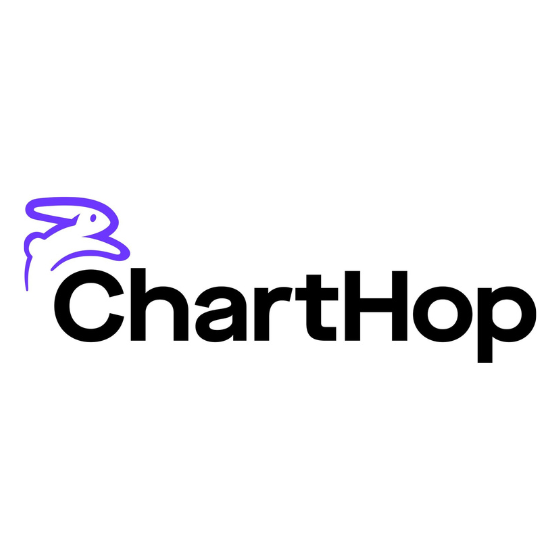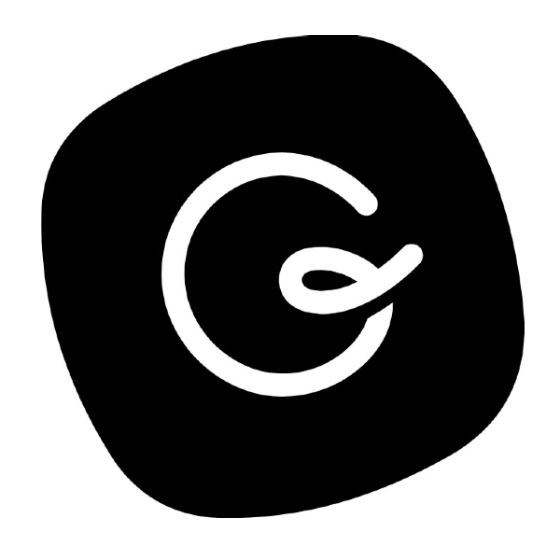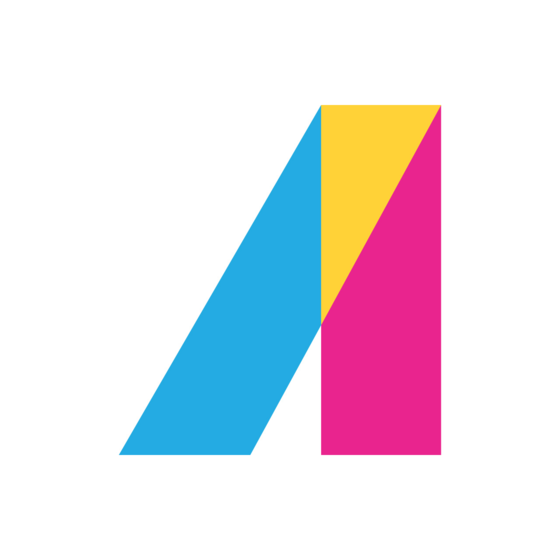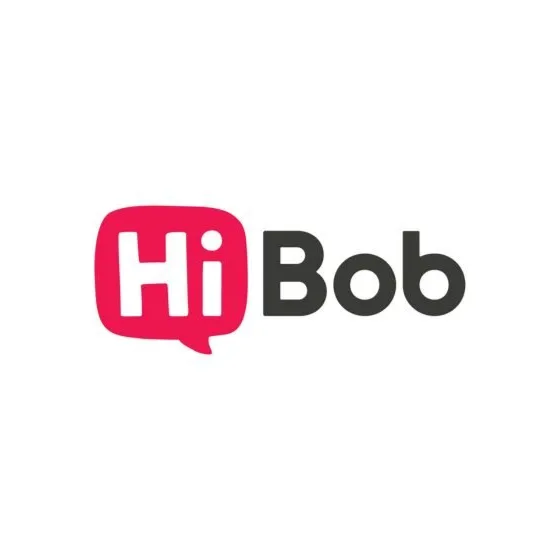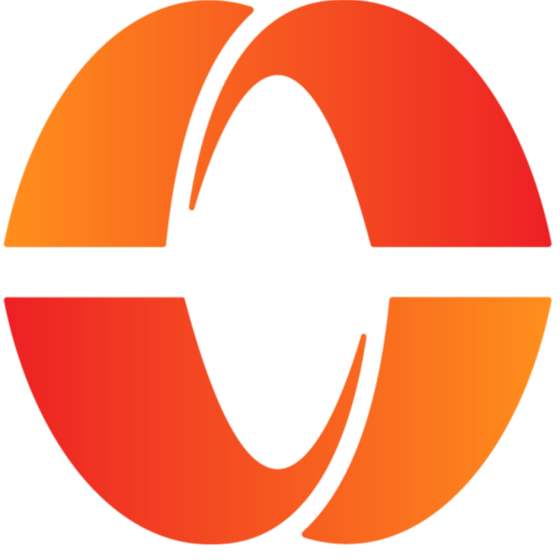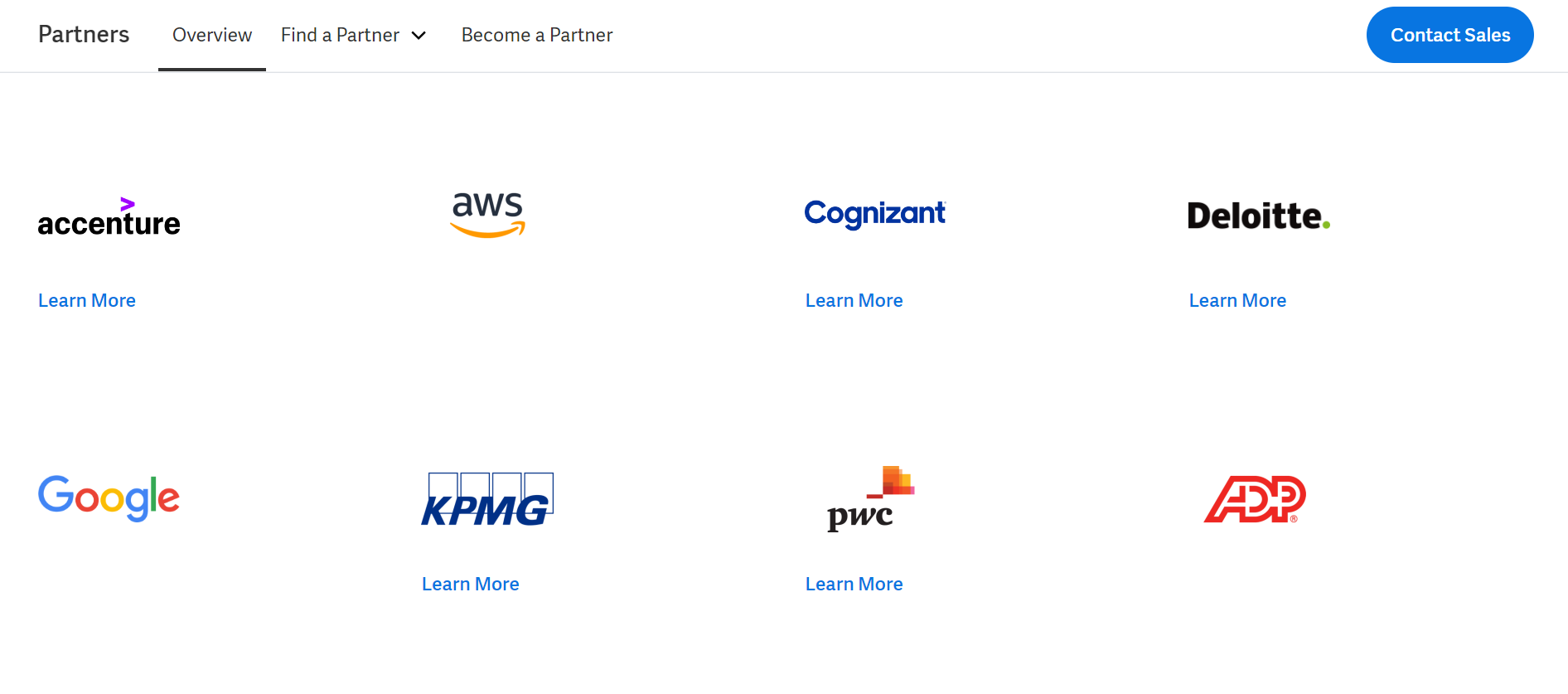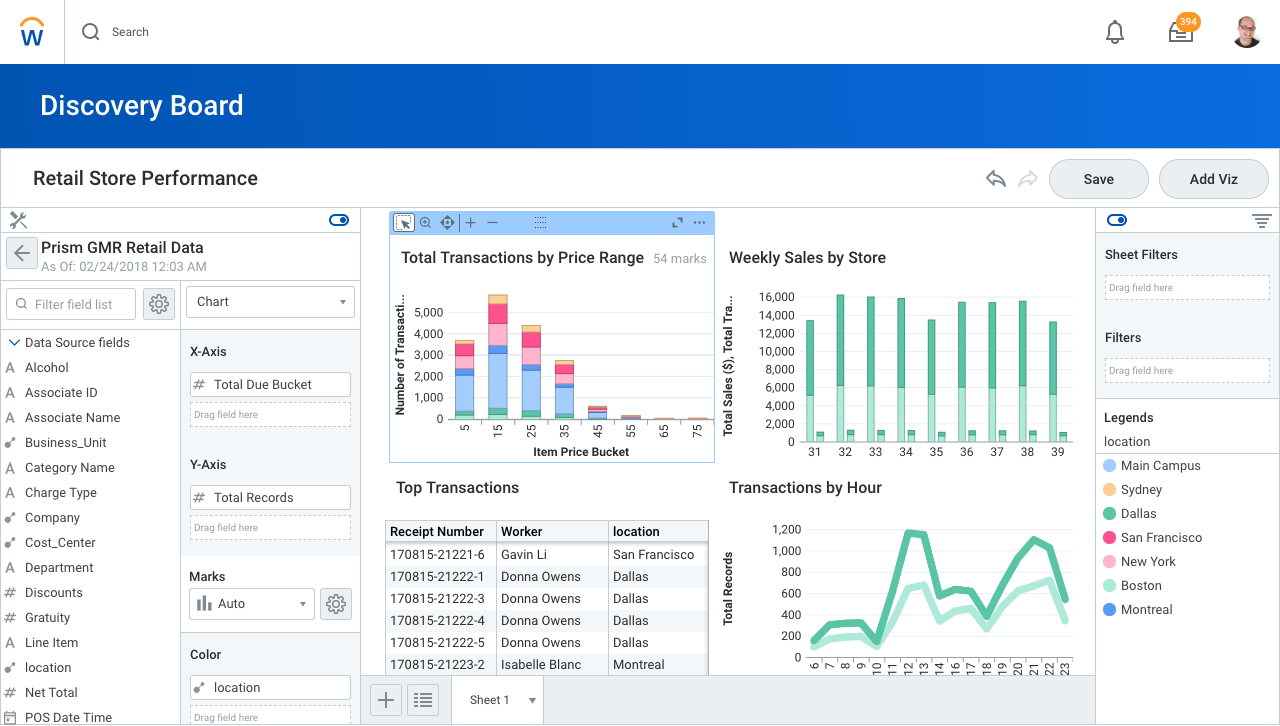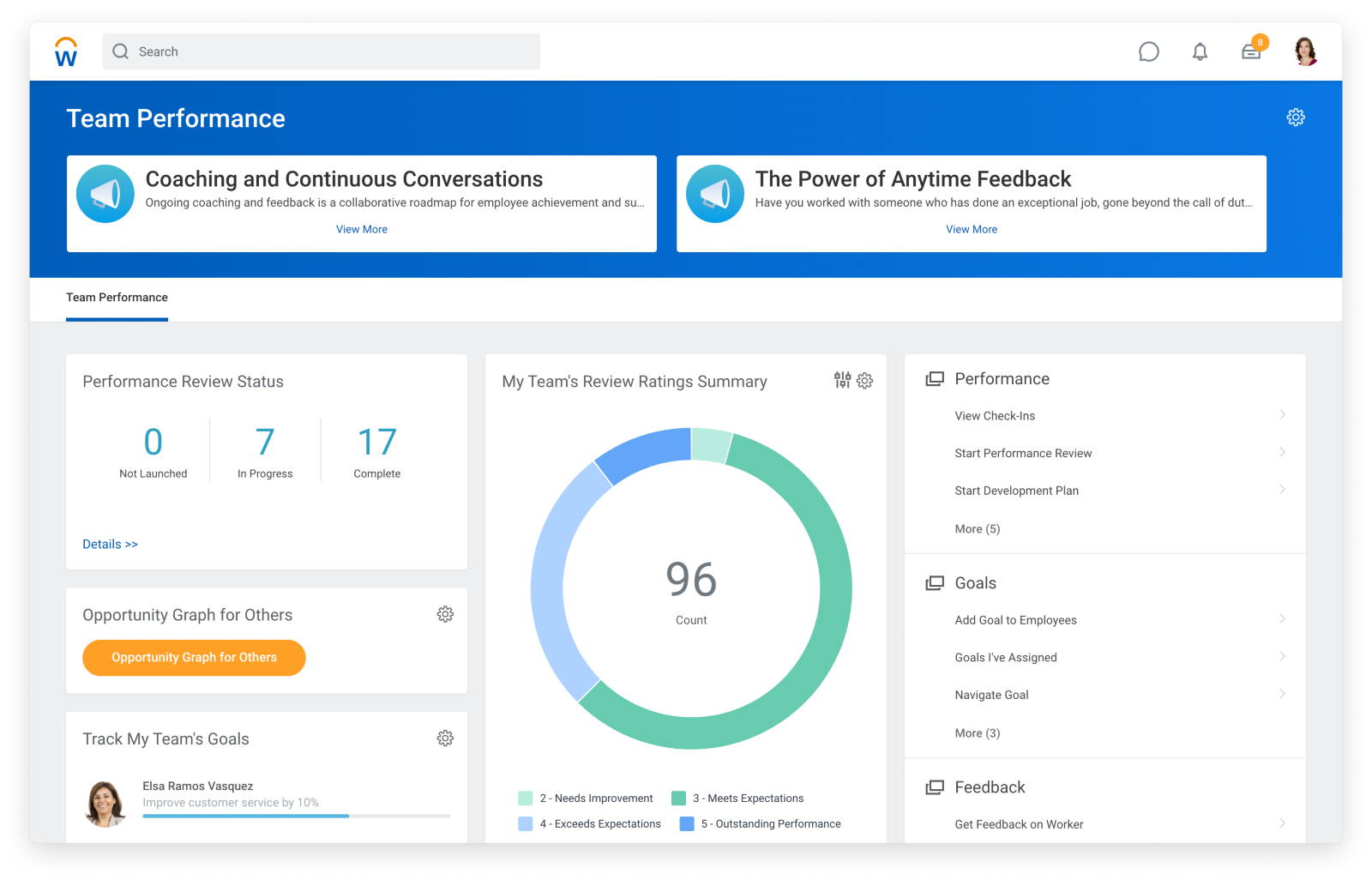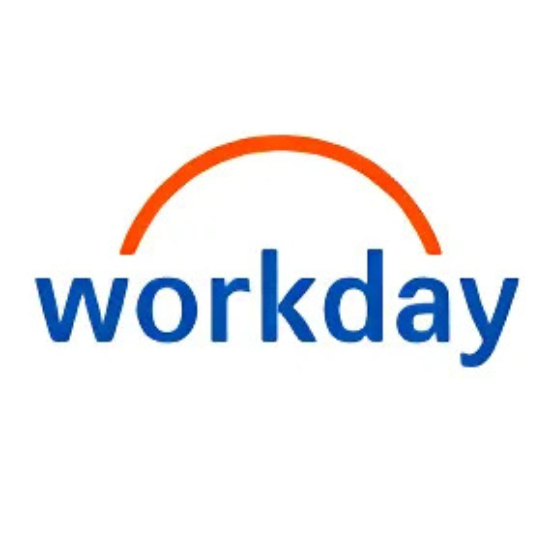-

ChartHop
Visit WebsiteThis is an aggregated rating for this tool including ratings from Crozdesk users and ratings from other sites.4.3 -

Guru
Visit WebsiteThis is an aggregated rating for this tool including ratings from Crozdesk users and ratings from other sites.4.6 -

Absorb LMS
Visit WebsiteThis is an aggregated rating for this tool including ratings from Crozdesk users and ratings from other sites.4.6
In this review, I'm going to share my analysis and evaluation from hands-on experience with Workday HCM. But first, if you're just beginning your search for a Human Capital Management (HCM) software, check out my picks of the best HCM software.
You probably already know Workday HCM is among the most popular HR platforms out there, but you need to better understand what's good, and not so good about it. This in-depth Workday HCM review will walk you through pros and cons, features and functionality, to help guide you to better understand its capabilities and suitability for your scenario.
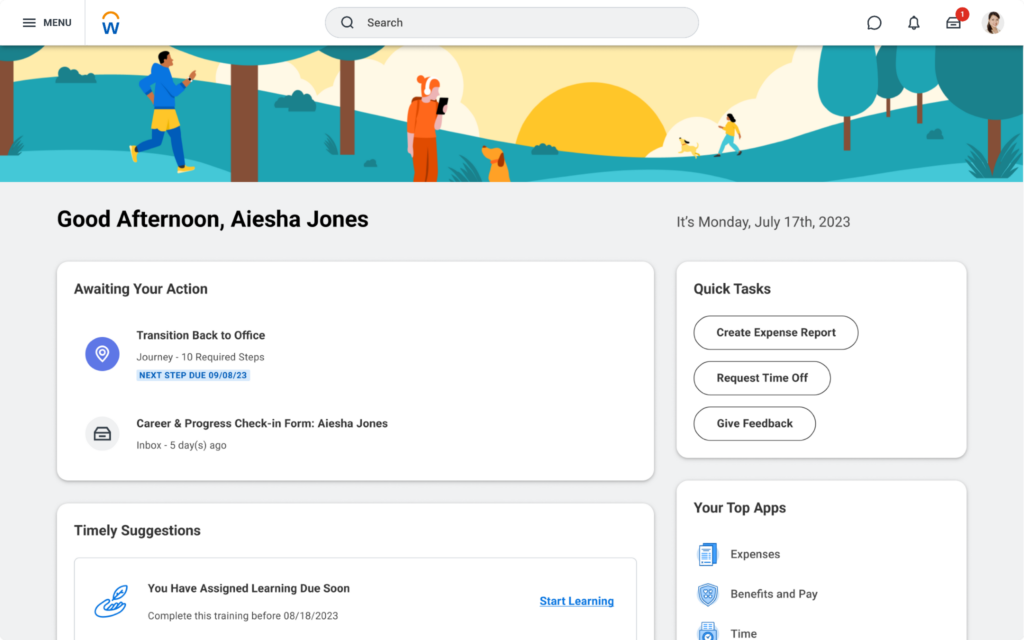
Summary: Workday HCM
Workday Human Capital Management is a cloud-based HCM system that unifies HR, talent, payroll, and workforce management into a single platform. It’s commonly used by HR managers, administrators, payroll specialists, recruiters, and learning coordinators to manage the full employee lifecycle. It helps businesses modernize HR operations, make data-driven people decisions, and engage their workforce.
Workday HCM addresses common pain points like disjointed HR tools and systems, manual processes, lack of workforce visibility, compliance risk, and talent retention. It has features that support core human resource management, compensation, benefits administration, talent acquisition, performance and goal management, learning, workforce planning, and people analytics tasks.
Workday HCM Pros
- User experience: Workday has an intuitive, user-friendly interface that’s easy for employees and managers to navigate and use effectively.
- Reporting tools: It offers powerful and flexible analytics and reporting capabilities to gain insights into workforce data.
- Talent management: Workday provides a strong set of features for recruiting, onboarding, performance management, succession planning, and employee development.
Workday HCM Cons
- Configuration: The initial setup and configuration process can be complex and time-consuming compared to other HCM systems.
- Customer support: Some users report challenges getting timely and helpful responses from Workday customer support when issues arise.
- Learning curve: Due to the wide range of features and options, it can take significant time for HR teams to learn and train employees to use the system.
Workday HCM Expert Opinion
In my opinion, Workday HCM is one of the strongest choices available in human capital management technology market today for mid-sized and large enterprises. Its modern, intuitive user interface sets it apart from more complex legacy platforms. While it may lack some of the customization and global features of rivals like SAP SuccessFactors and Oracle, Workday's SaaS-based delivery model enables faster deployment and continuous updates. This allows companies to stay current in a rapidly changing HR landscape.
I believe Workday is an ideal fit for organizations that want to improve their employee experience and HR efficiency through a unified, user-friendly platform. Its strengths in areas like skills tracking and people analytics also make it appealing for companies focused on strategic workforce planning. However, large multinationals with highly complex HR needs across many countries may find gaps in Workday's global capabilities compared to larger competitors. Overall, Workday HCM is a compelling option for most mid-market and enterprise companies looking to modernize their HR technology.
Why Trust Our Software Reviews
We've been testing and reviewing Human Capital Management Systems (HCM) since 2019. As HR experts ourselves, we know how critical and difficult it is to make the right decision when selecting software. We invest in deep research to help our audience make better software purchasing decisions. We've tested more than 2,000 tools for different HR management use cases and written over 1,000 comprehensive software reviews. Learn how we stay transparent & our software review methodology.
-

Deel
Visit WebsiteThis is an aggregated rating for this tool including ratings from Crozdesk users and ratings from other sites.4.8 -

HiBob
Visit WebsiteThis is an aggregated rating for this tool including ratings from Crozdesk users and ratings from other sites.4.5 -

Paylocity
Visit WebsiteThis is an aggregated rating for this tool including ratings from Crozdesk users and ratings from other sites.4.5
Are You a Good Fit for Workday HCM?
Who would be a good fit for Workday HCM?
Mid-size to large enterprises that manage complex HR processes across the employee lifecycle are best suited for Workday HCM. Its robust features like recruiting, compensation, payroll, time tracking, and more in a single system are ideal for companies looking for a comprehensive and highly configurable cloud HR software. Its mobile app and intuitive interface make it accessible to a distributed workforce.
Who would be a bad fit for Workday HCM?
Startups and small businesses with straightforward HR needs will likely find Workday HCM too complex and expensive for their requirements. Its implementation takes several months, so companies that need a quick solution might opt to look elsewhere. The depth of features could also overwhelm small HR teams.
End users that rely heavily on third-party applications may have integration challenges, since Workday's open APIs require technical skill to utilize. Companies that need major customization will also find the system too rigid. Workday's features target office workers, so companies with many hourly or seasonal employees may prefer other options.
Best Use Cases for Workday HCM
- Large enterprises: Workday HCM's extensive features and flexibility work well for companies with over 1,000 employees and intricate HR requirements.
- Global operations: Workday supports organizations operating internationally with multi-language, multi-currency, and localized compliance built-in.
- Healthcare: Many leading healthcare organizations like Sanofi and Centene use Workday HCM to manage their workforce.
- Financial services: Workday provides the stringent security, auditing, and reporting features needed in highly regulated industries like banking and insurance.
- HR professionals: HR teams value Workday's unified platform that lets them manage the entire employee lifecycle in one place.
- High-growth companies: The scalability of Workday's cloud-based system makes it a smart long-term choice for rapidly expanding businesses.
Worst Use Cases for Workday HCM
- Small businesses: Companies with under 200 employees may find Workday's broad-spanning capabilities to be more than they need.
- Decentralized workforces: Heavily unionized industries or franchised business models are harder to manage in Workday's centralized system.
- Organizations on a budget: The premium price point for Workday's sophisticated HCM platform can be cost-prohibitive for budget-conscious companies.
- Manufacturing: Companies with hourly, shift-based, and unionized workers often require more specialized workforce management tools.
- Technologically immature companies: Transitioning to Workday requires technical readiness and change management that less tech-savvy organizations may struggle with.
- Businesses seeking simplicity: Companies wanting a basic, no-frills HCM solution may be overwhelmed by Workday's feature-rich platform and extensive configuration options.
-

Deel
Visit WebsiteThis is an aggregated rating for this tool including ratings from Crozdesk users and ratings from other sites.4.8 -

HiBob
Visit WebsiteThis is an aggregated rating for this tool including ratings from Crozdesk users and ratings from other sites.4.5 -

Paylocity
Visit WebsiteThis is an aggregated rating for this tool including ratings from Crozdesk users and ratings from other sites.4.5
Workday HCM Evaluation Summary
- Core Functionality: ⭐⭐⭐⭐
- Standout Features: ⭐⭐⭐⭐
- Ease of Use: ⭐⭐⭐
- Onboarding: ⭐⭐⭐⭐
- Customer Support: ⭐⭐⭐
- Integrations: ⭐⭐⭐⭐
- Customer Reviews: ⭐⭐⭐⭐
- Value for Money: ⭐⭐⭐
Review Methodology
We're a team of software experts who obsess about the features and functionality of different platforms. We know how critical—yet difficult and confusing—software selection can be. We test and score software to find the best solutions, whatever the use case may be.
Using our objective, data-driven testing methodology, we've tested 300+ software. We dedicate ourselves to being objective in fully and fairly testing software, to get beyond the marketing fluff and truly understand the platform.
We've developed robust testing scenarios to use the software in the same way you will. We leverage our own first-hand, practical experience with the tools, complemented by interviews with users, experts, and software vendors.
How We Test & Score Human Capital Management (HCM) Software
We've spent years building, refining, and improving our software testing and scoring system for HCM and other HR software. The rubric is designed to capture the nuances of software selection, and what makes an HCM effective, focusing on critical aspects of the decision-making process.
Below, you can see exactly how our testing and scoring work across eight criteria. It allows us to provide an unbiased evaluation of the software based on core functionality, standout features, ease of use, onboarding, customer support, integrations, user reviews, and value for money.
Core Functionality (25% of final scoring)
For human capital management software, the core functionality we test and evaluate are:
- Recruiting: Efficiently source, track and hire top talent
- Onboarding: Seamlessly integrate new hires into the organization
- Performance management: Set goals, provide feedback, and conduct reviews
- Learning management: Deliver and track employee training and development
- Compensation management: Administer salaries, bonuses, and equity plans
- Reporting & Analytics: Generate insights from workforce data
Standout Features (20% of final scoring)
We evaluate uncommon, standout features that go above and beyond the core functionality typically found in human capital management software. A high score reflects specialized or unique features that make the product faster, more efficient, or offer additional value to the user.
Ease of Use (15% of final scoring)
We consider how quick and easy it is to execute the tasks defined in the core functionality using the platform. High-scoring software is well designed, intuitive to use, offers mobile apps, provides templates, and makes relatively complex tasks seem simple.
Onboarding (10% of final scoring)
We know how important rapid team adoption is for a new platform, so we evaluate how easy it is to learn and use the HCM software with minimal training. We evaluate how quickly a team member can get set up and start using the software with no experience. High-scoring software indicates little or no support is required.
Customer Support (10% of final scoring)
We review how quick and easy it is to get unstuck and find help by phone, live chat, or knowledge base. An HCM that provides real-time support scores best, while chatbots score worst.
Integrations (10% of final scoring)
We evaluate how easy it is to integrate with other tools typically found in an HR tech stack to expand the functionality and utility of the software. HCM software offering lots of native integrations, 3rd party connections, and API access to build customizable integrations score best.
Customer Reviews (10% of final scoring)
Beyond our own testing and evaluation, we consider the net promoter score from current and past customers. We review their likelihood, given the option, to choose the same human capital management software again for the core functionality. A high-scoring software reflects a high net promoter score from current or past customers.
Value for Money (10% of final scoring)
Lastly, in consideration of all the other criteria, we review the average price of entry-level plans against the core features and consider the value of the other evaluation criteria. Software that delivers more, for less, will score higher.
Through this comprehensive approach, focusing on core functionalities, standout features, usability, onboarding, customer support, value, and customer reviews, I aim to identify human capital management software that not only meet but exceed expectations, ensuring teams have the tools they need to succeed.
Workday HCM Review
Core Human Capital Management Software Functionality
Workforce Management: Workday HCM manages the full hire-to-retire lifecycle, automating HR processes related to staffing, onboarding, compensation, and job changes.
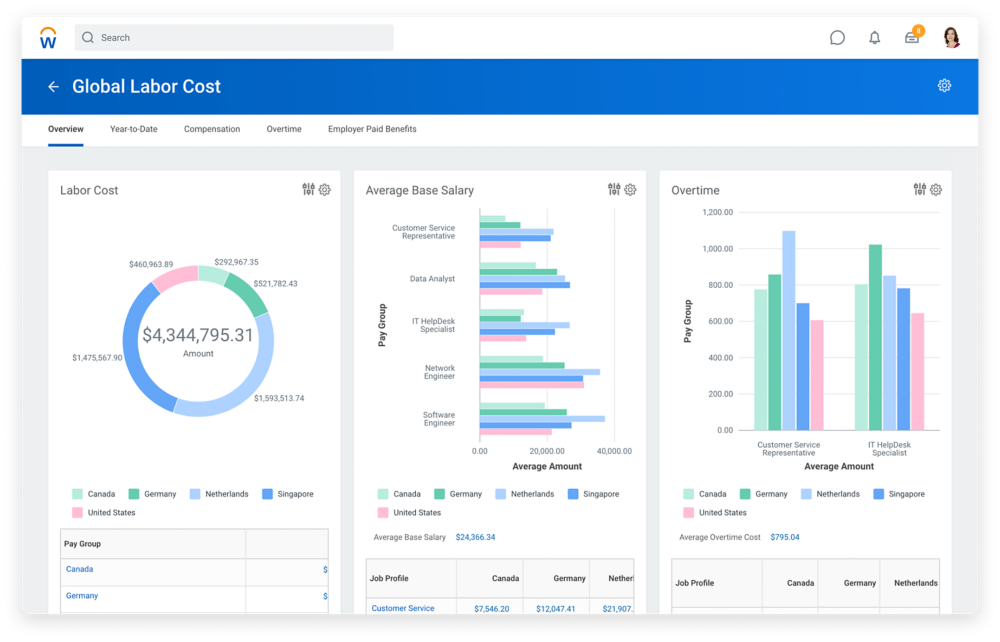
Talent Management: Workday HCM offers tools for recruiting, performance management, succession planning, and learning to attract, develop, and retain talent.
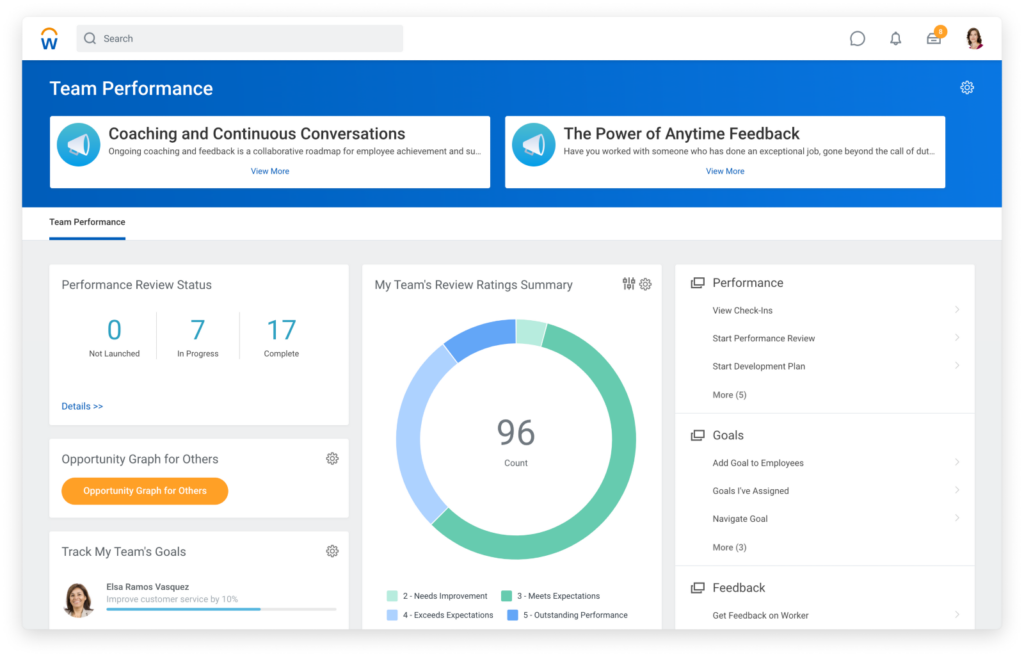
Compensation: The system streamlines merit increases, bonus payments, and stock awards, with built-in budgeting and approval workflows.
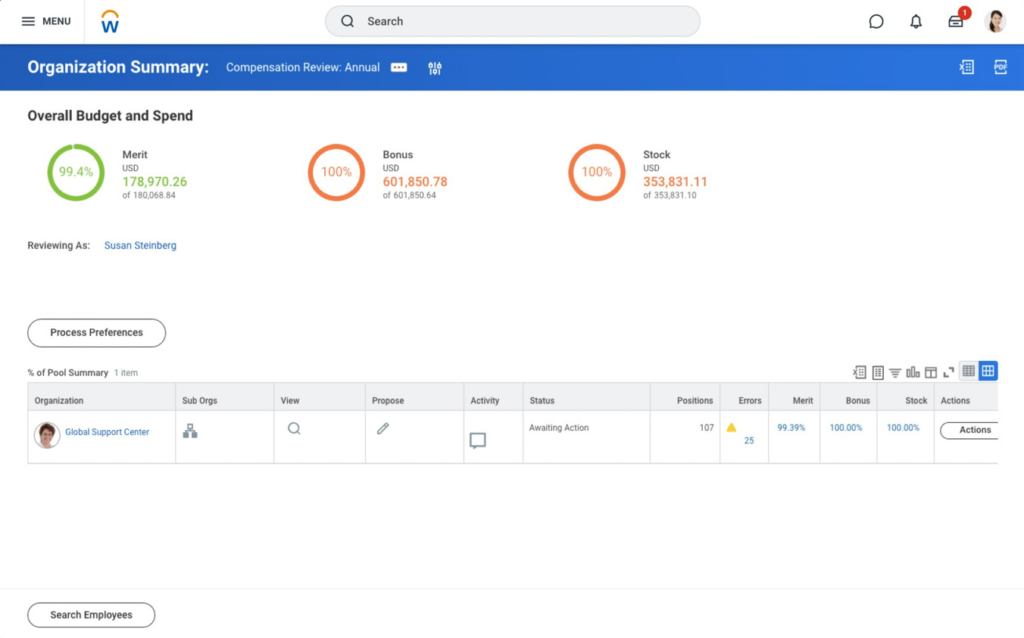
Benefits: Workday HCM allows employees to manage their benefits elections and supports complex eligibility rules while integrating with carriers.
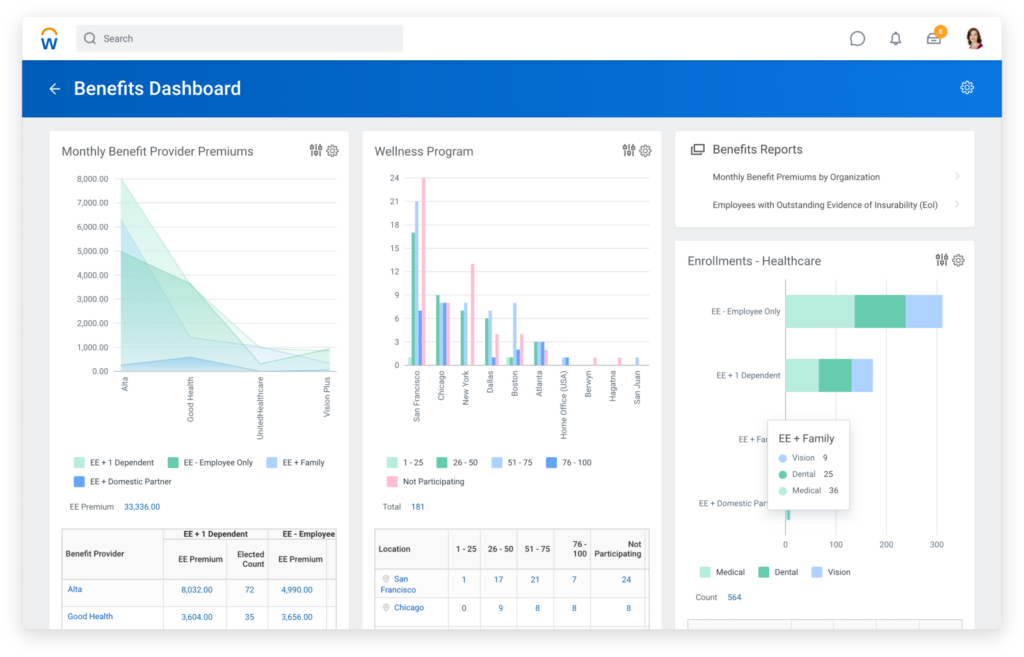
Time Tracking: It provides robust time tracking capabilities, supporting multiple entry methods and complex pay rules.
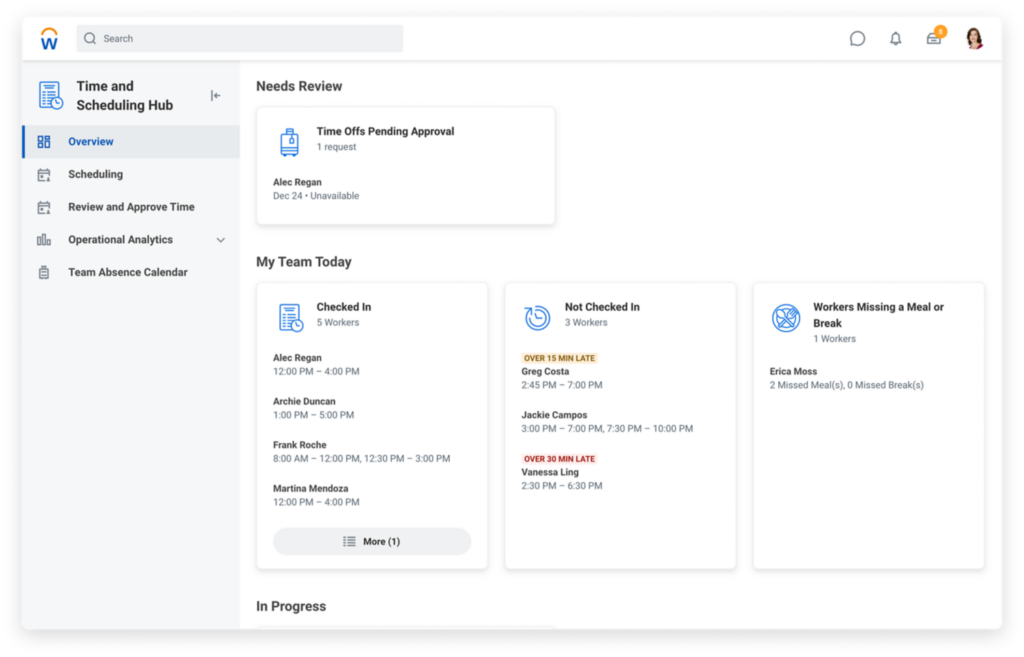
Reporting and Analytics: Real-time reporting and analytics across all HR data, enabling managers to access dashboards and build custom reports without IT support.
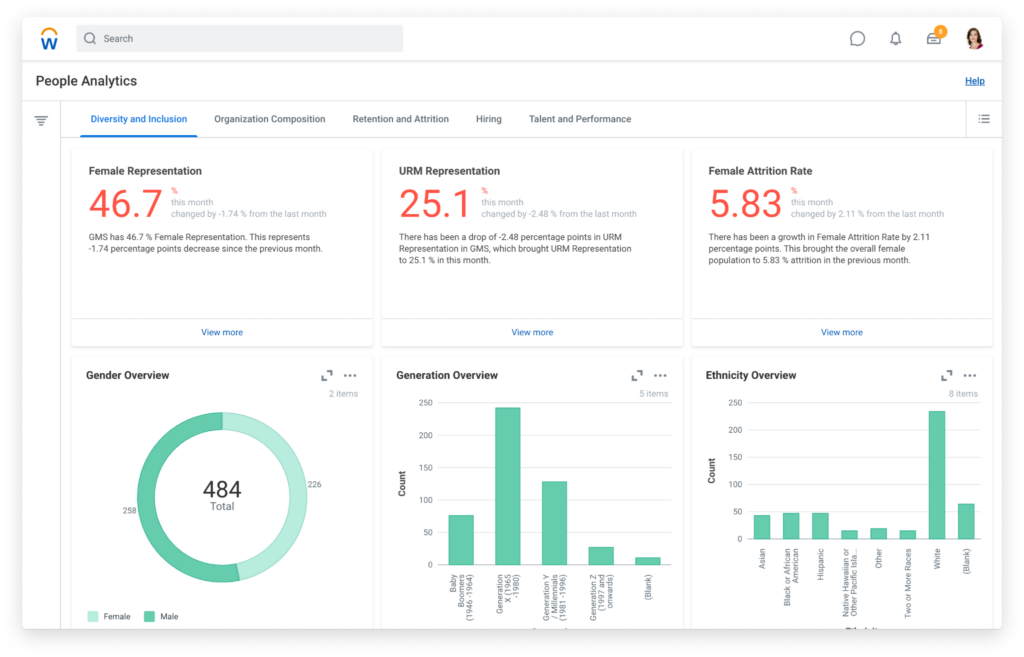
Workday HCM Standout Features
Skills Cloud: This feature uses machine learning to infer employee skills from their profiles, enhancing skills-based talent management.
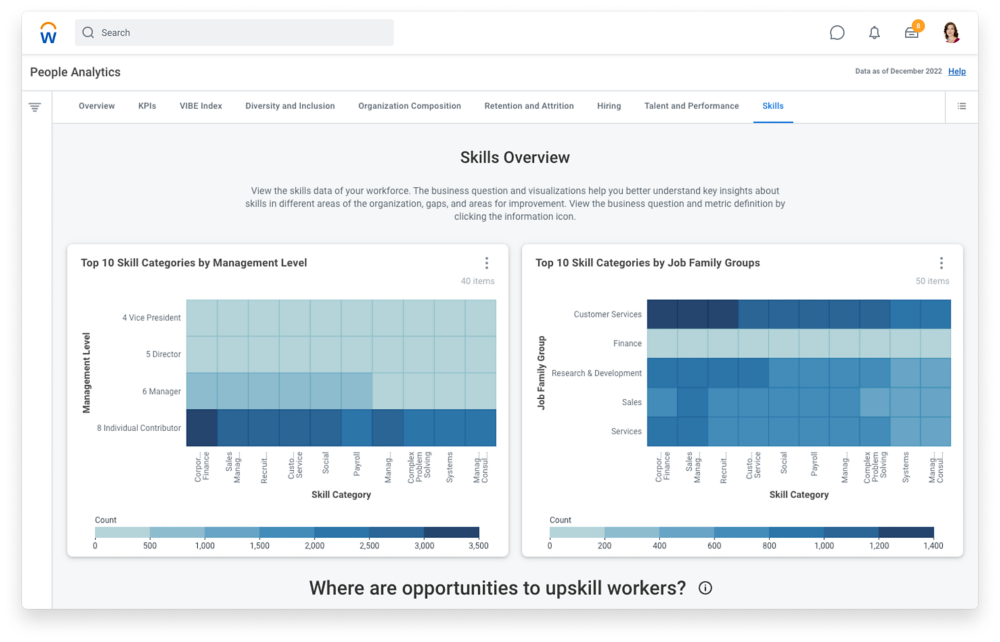
Prism Analytics: Workday Prism Analytics integrates HCM data with other sources for advanced workforce analytics, offering data management, discovery, and visualization.
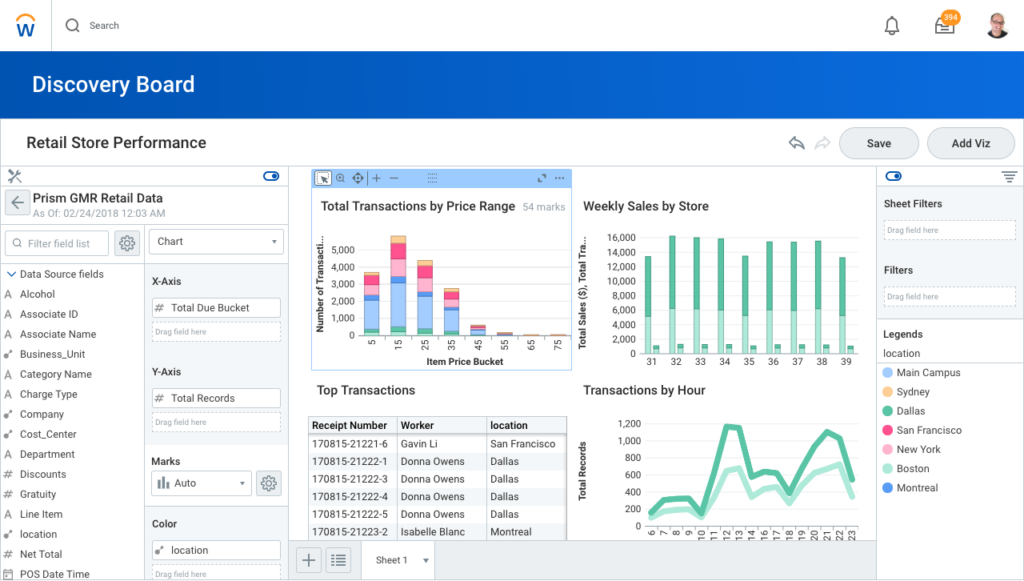
Ease of Use
Workday HCM is intuitive and user-friendly, with a clean and uncluttered interface. Common HR tasks can be completed efficiently, often in just a few clicks. Embedded help resources allow users to quickly find answers to questions.
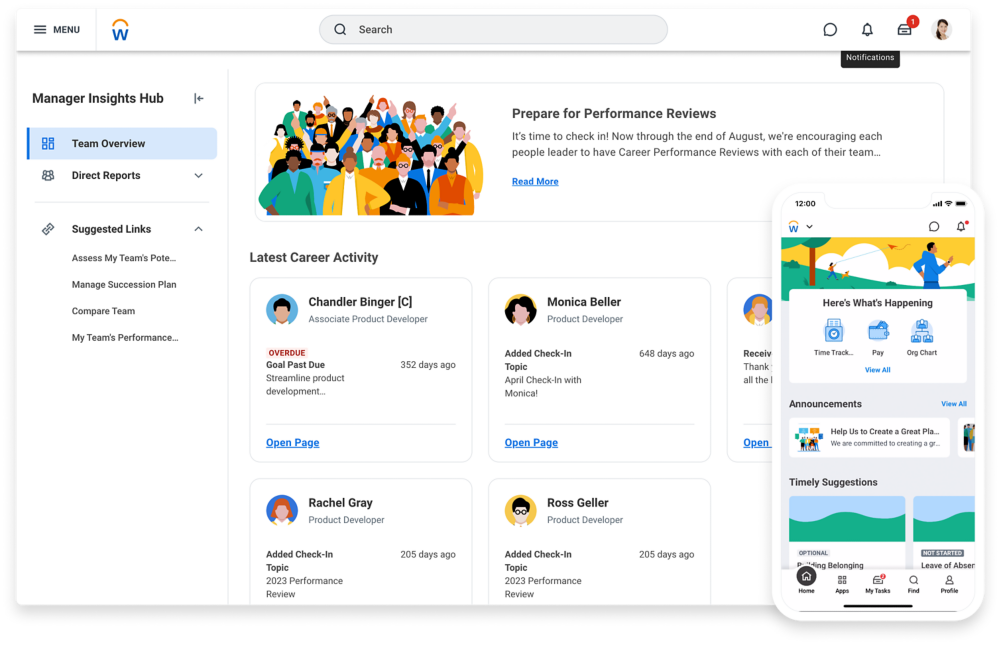
Onboarding
Workday HCM offers a hands-on implementation experience with a dedicated partner, which typically takes 6-9 months. The platform provides comprehensive on-site and virtual training both before and after go-live. Additionally, Workday offers a customer community, self-paced learning resources, and 24/7 support to facilitate ongoing user adoption.
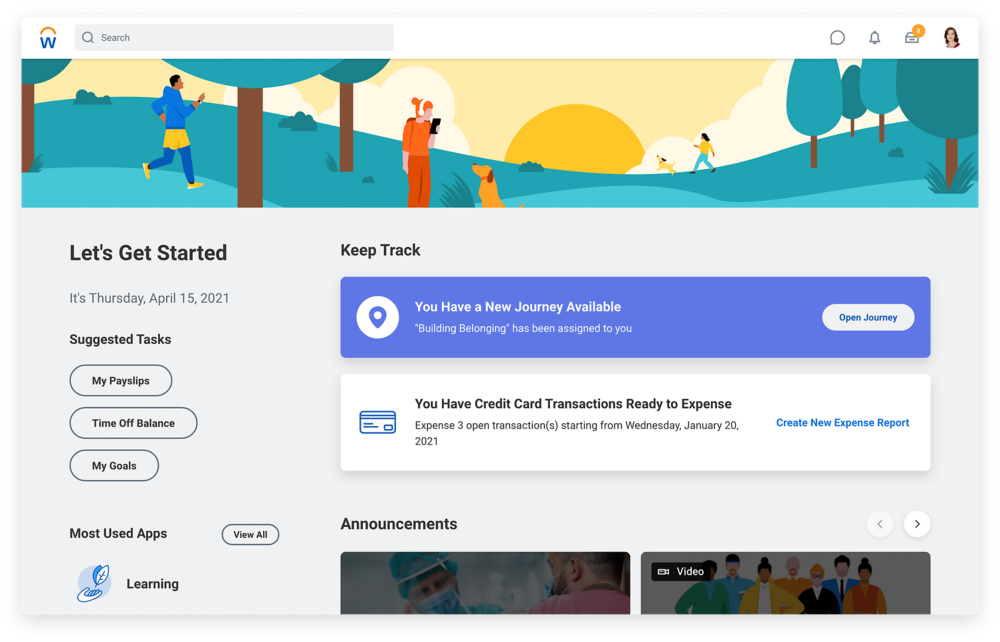
Customer Support
Workday HCM provides 24/7 customer support via phone and a customer portal for submitting cases online. The online community allows customers to connect with peers and experts. Workday also hosts regular customer feedback sessions and product roadmap reviews to stay aligned with user needs.
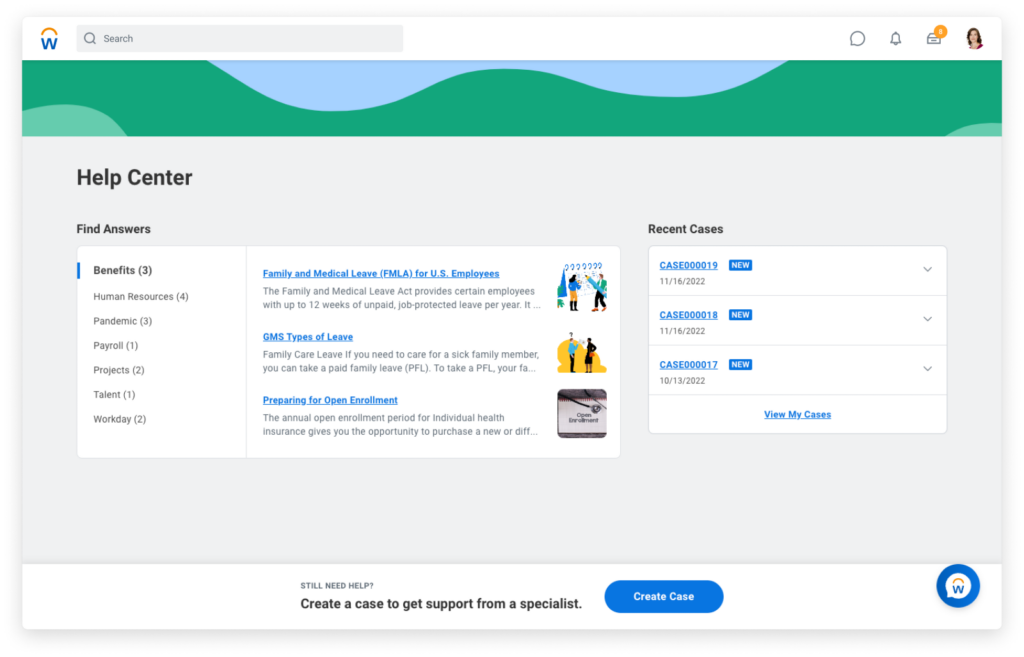
Integrations
Workday HCM integrates natively with several Workday products, including Workday Payroll, Financial Management, Adaptive Planning, Extend, and Student. It also connects with external applications like Adobe Sign, Beeline, Salesforce, ServiceNow, Slack, Unanet, and Vertex.
APIs and software development kits are available for building custom integrations. Additionally, a growing ecosystem of third-party add-ons is accessible through the Workday Marketplace.
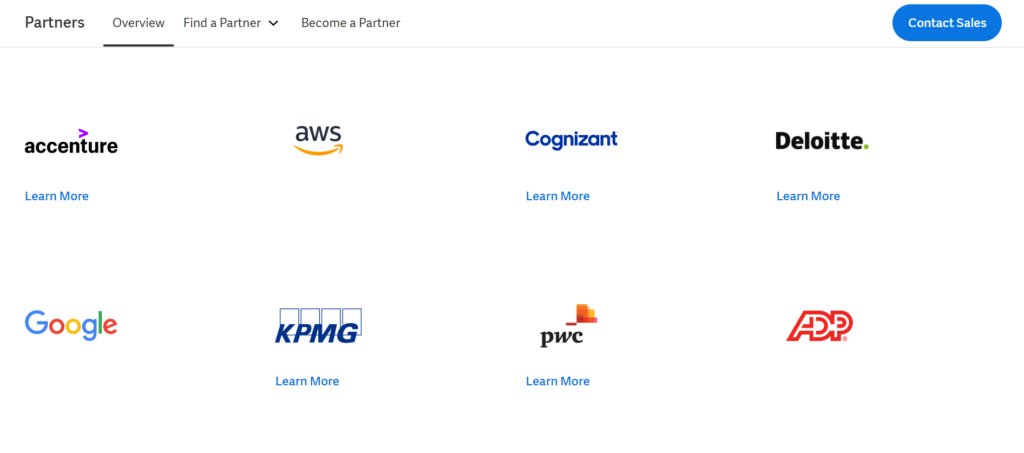
Value for Money
Workday HCM is generally considered to be on the expensive end of the spectrum when it comes to pricing. Workday positions itself as a premium offering targeting mid-size to large enterprise customers, rather than small businesses.
While Workday does not publicly release detailed pricing information, third-party estimates suggest costs start around $100-200 per employee per year. This places Workday at a 20-50% premium compared to many mid-market rivals. Customers praise Workday's comprehensive HCM capabilities across the employee lifecycle, but it is ultimately best suited for larger, more complex organizations that can afford the higher price point and Workday Certification for HR teams.
Workday's pricing model offers different packages based on the selected products and modules:
- Core HCM package with key HR functionality
- Talent management add-ons for recruiting, learning, performance, and succession
- Workforce management tools for scheduling, time tracking, and absence
- Payroll and benefits administration
- Advanced analytics and reporting
The final cost will vary significantly depending on company size, number of modules purchased, length of contract, and any discounting. Despite the price premium, Workday is consistently ranked as a leader in analyst evaluations of HCM software due to the strength of its technology and high customer satisfaction. For the right enterprise buyer, Workday can deliver value that justifies the cost.
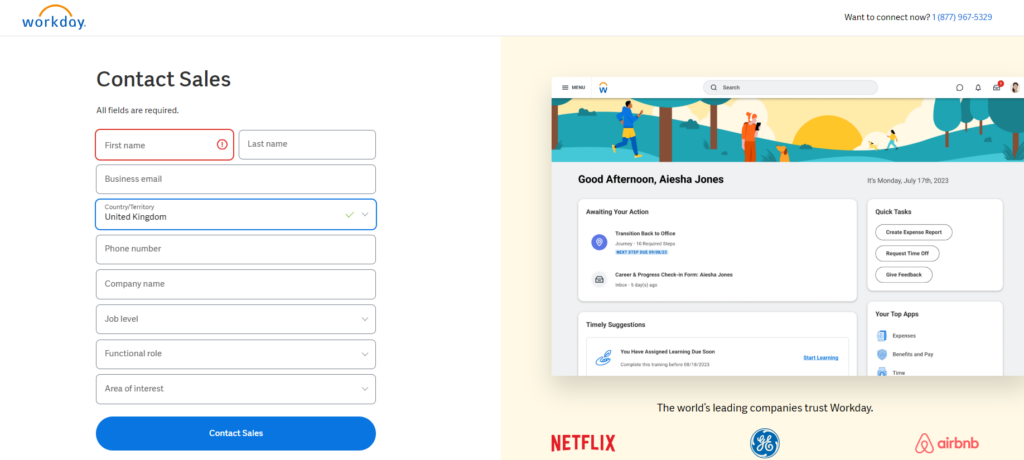
Product Specifications
| Feature | Included in Workday HCM |
| Employee demographic data | ✅ |
| Organizational structure management | ✅ |
| Payroll Management | ✅ |
| Benefits administration | ✅ |
| Time and attendance tracking | ✅ |
| Recruiting and applicant tracking | ✅ |
| Onboarding | ✅ |
| Performance management | ✅ |
| Compensation management | ✅ |
| Learning management | ✅ |
| Succession planning | ✅ |
| HR analytics and reporting | ✅ |
| Employee self-service portal | ✅ |
| Mobile app | ✅ |
| Globalization features (multiple languages, currencies, etc) | ✅ |
| Social networking tools | ❌ |
| Competency management | ❌ |
| Mentoring program management | ❌ |
| Alumni management for ex-employees | ❌ |
Workday HCM Alternatives
If you're looking for alternative Workday options, here are a few worth checking out:
- Oracle HCM Cloud: Has AI and machine learning capabilities that Workday lacks, plus integrates with other Oracle cloud applications.
- Namely: Serves mid-sized companies with transparent pricing that can save costs compared to Workday's enterprise contracts.
- UKG Pro: Praised by users for its intuitive interface and strong customer support, with particular strengths in healthcare, manufacturing, and hospitality.
- ADP Workforce Now: Focuses on the specific needs of small to medium-sized businesses, with affordable pricing and highly rated payroll and time tracking.
Workday HCM Frequently Asked Questions
What is Workday HCM?
Workday HCM is a cloud-based human capital management software system. It provides a single system for organizations to manage all aspects of HR, including payroll, benefits, talent management, time tracking, recruiting, and more. Workday HCM helps companies streamline HR processes, make data-driven people decisions, and improve the employee experience.
Is there a mobile app for Workday HCM?
Yes, Workday offers a mobile app for iOS and Android devices that provides on-the-go access to key HCM functionality. Employees can use the app to complete self-service HR tasks like submitting time-off requests, viewing paystubs, updating personal information, and more. Managers can view team information and approve requests. The mobile app uses the same security protections as the web version.
Is Workday HCM HIPAA compliant?
Yes, Workday HCM is HIPAA compliant for its cloud offerings. Workday signs Business Associate Agreements with covered entities and follows the privacy, security, and breach notification regulations required by HIPAA. Workday also undergoes regular third-party audits to validate its compliance with HIPAA standards.
Is Workday HCM SOC 2 compliant?
Yes, Workday HCM is SOC 2 compliant. Workday has obtained SOC 1 and SOC 2 Type II reports from independent auditors attesting to the operating effectiveness of its controls relevant to security, availability, and confidentiality. These reports demonstrate that Workday meets the SOC 2 trust services criteria.
Is Workday HCM FedRAMP certified?
Yes, Workday has achieved FedRAMP Moderate Authorization for its Government Cloud offering. This means it has met the rigorous security requirements set by the Federal Risk and Authorization Management Program and is authorized for use by federal agencies. Workday Government Cloud is hosted in a separate environment dedicated to government customers.
Is Workday HCM GDPR compliant?
Yes, Workday HCM is committed to GDPR compliance. Workday provides tools and processes to help customers fulfill their GDPR obligations related to individual rights, data protection, and privacy by design. As a data processor, Workday executes its customers’ instructions about personal data processing. Workday is also Privacy Shield certified for EU and Swiss data transfers.
What security features does Workday HCM offer?
Workday uses multiple layers of security to protect customer data:
- Data encryption in transit and at rest
- Multiple levels of access controls and authentication
- Real-time activity logging and auditing
- Secure network architecture and firewalls
- Ongoing security monitoring and threat response
Workday also regularly undergoes independent security audits and penetration testing. Its data centers are physically secured and staffed 24/7.
How does Workday HCM ensure high availability?
Workday uses a highly available and redundant cloud architecture to ensure the HCM system remains accessible. This includes:
- Redundant data centers with failover capabilities
- Load balancing to handle traffic spikes
- Disaster recovery and business continuity plans
- Continuous data backups
- 99.5% or greater uptime guarantee
Customers can access real-time availability status via Workday’s Trust Site.
Workday HCM Company Overview & History
Workday is a leading provider of enterprise cloud applications for finance and human resources. The company is a publicly traded organization headquartered in Pleasanton, California, with over 15,000 employees worldwide. Workday's main product is its cloud-based human capital management (HCM) platform, which helps organizations manage HR, payroll, talent, time tracking, and employee data. Workday also offers financial management and student applications.
Some of Workday's notable clients include Walmart, Target, Netflix, Bank of America, and Amazon. The company is known for its strong corporate culture and has been recognized as a great place to work by Fortune and Glassdoor. As of 2023, Workday has a market capitalization of over $55 billion and annual revenues exceeding $6 billion. Workday stock trades on the NASDAQ under the ticker WDAY.
Workday HCM Major Milestones
- 2005: Founded by Aneel Bhusri and Dave Duffield, former PeopleSoft executives
- 2006: Released Workday HCM product
- 2008: Reached 100 customers milestone
- 2009: Closed $75 million series E funding round
- 2012: Went public, raising over $730 million in its IPO
- 2014: Launched Workday Recruiting application
- 2016: Acquired Platfora, a big data analytics company, for over $200 million
- 2018: Reached $2 billion in annual revenue
- 2020: Announced David Somers as new Chief People Officer
- 2021: Promoted Doug Robinson to Co-President
- 2022: Named a Leader in Gartner Magic Quadrant for Cloud HCM Suites for the 7th consecutive year
Want to learn more about WorkdayHCM? Check out their site for additional information.
Pricing upon request
Free demo available
What’s Next?
To remain up to date on all the latest in people management, subscribe to our newsletter for leaders and managers. You'll receive insights and offerings tailored to leaders and HR professionals straight to your inbox.

